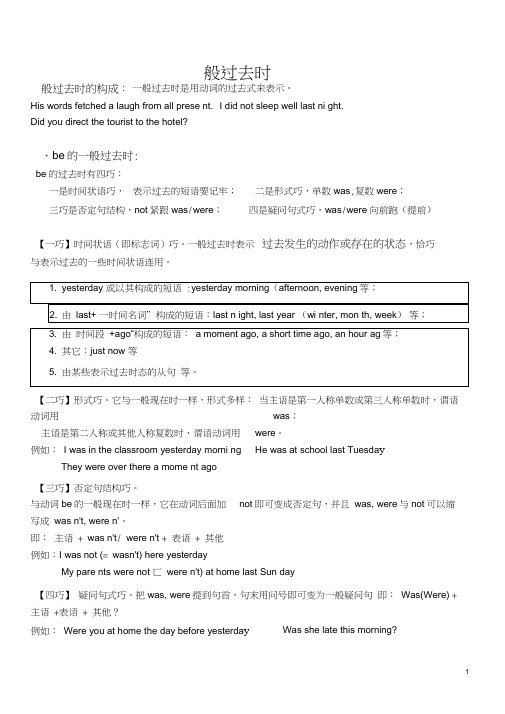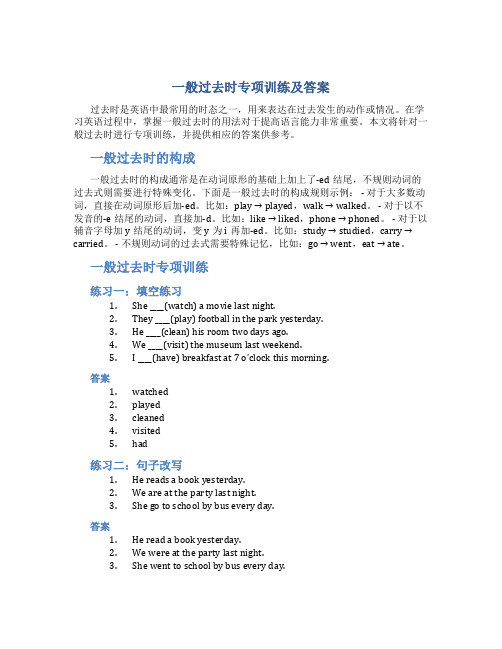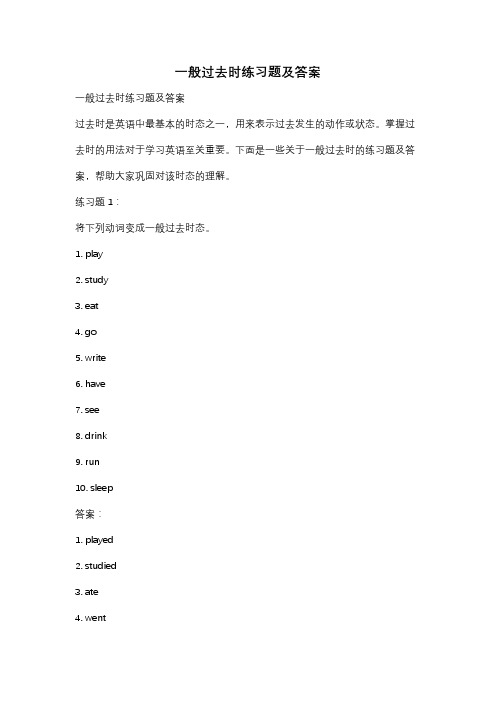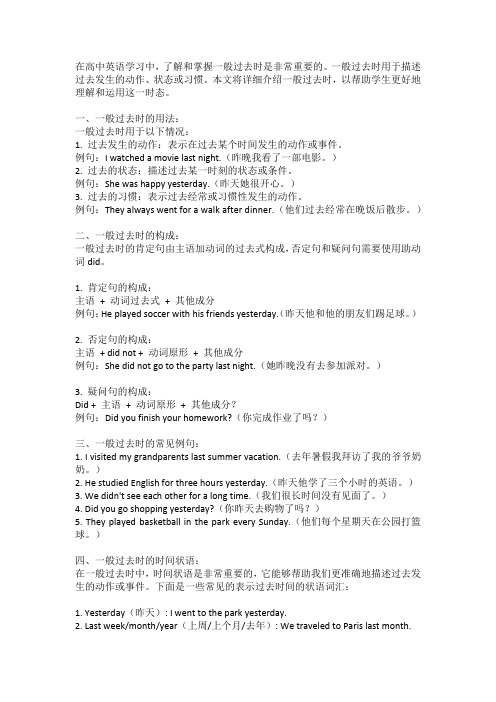英语专项 语法 时态 2 一般过去时 讲解+练习+答案 simple past
一般过去时详细讲解与练习题含答案

一般过去时详细讲解与练习题含答案(word版可编辑修改)编辑整理:尊敬的读者朋友们:这里是精品文档编辑中心,本文档内容是由我和我的同事精心编辑整理后发布的,发布之前我们对文中内容进行仔细校对,但是难免会有疏漏的地方,但是任然希望(一般过去时详细讲解与练习题含答案(word版可编辑修改))的内容能够给您的工作和学习带来便利。
同时也真诚的希望收到您的建议和反馈,这将是我们进步的源泉,前进的动力。
本文可编辑可修改,如果觉得对您有帮助请收藏以便随时查阅,最后祝您生活愉快业绩进步,以下为一般过去时详细讲解与练习题含答案(word版可编辑修改)的全部内容。
They were over there a moment ago.刚才他们在那边。
【三巧】否定句结构巧。
与动词be的一般现在时一样,它在动词后面加not即可变成否定句,并且was, were与not可以缩写成wasn't, weren’t。
即:主语+ wasn't/ weren't +表语+其他.例如:I was not (=wasn't) here yesterday.昨天我不在这儿。
My parents were not (=weren't) at home last Sunday.上周日我父母不在家.【四巧】疑问句式巧。
把was, were提到句首,句末用问号即可变为一般疑问句。
即: Was(Were) +主语+表语+其他?这恰巧与动词be的一般现在时的疑问句式相似。
例如: Were you at home the day before yesterday﹖前天你在家吗?Was she late this morning﹖今天早上她迟到了吗?更巧的是疑问句的答语也相似,肯定回答用“Yes,主语+was/were.”;否定回答用“No,主语+wasn't/weren’t.”。
例如:—Were Wei Hua and Han Mei here just now﹖刚才魏华和韩梅在这儿吗?-Yes, they were. (No, they weren’t.)是的,她们在。
一般过去时的习题及答案

一般过去时的习题及答案一般过去时的习题及答案过去时是英语中最基本的时态之一,用来表示发生在过去的动作或状态。
在学习过去时时,习题是非常重要的一部分,通过习题的练习可以帮助我们巩固所学的知识,并提高我们的语言运用能力。
下面是一些关于一般过去时的习题及答案,希望对大家的学习有所帮助。
习题一:根据所给动词的原形,填入适当的过去式形式。
1. go → ___________2. eat → ___________3. see → ___________4. do → ___________5. run → ___________6. sleep → ___________7. write → ___________8. drink → ___________9. swim → ___________10. speak → ___________答案:1. went2. ate3. saw4. did5. ran6. slept7. wrote8. drank9. swam10. spoke习题二:根据所给的句子,选择正确的动词形式填空。
1. I ________ (watched / watch) a movie yesterday.2. They ________ (played / play) basketball last weekend.3. He ________ (visited / visit) his grandparents yesterday.4. She ________ (cooked / cook) dinner for her family last night.5. We ________ (visited / visit) the museum last month.答案:1. watched2. played3. visited4. cooked5. visited习题三:改写下列句子,将动词变为过去式。
(word完整版)初中英语时态讲解及练习(含答案),推荐文档

时态1. 一般现在时●形式:do does(单数第三人称)●意义:一般现在时表示客观的、普遍性的真理以及经常性的事件。
●用法:A) 表示现在发生的动作、情况、状态和特征。
B) 经常性、习惯性动作。
e.g.:He always helps others. (他总是帮助别人。
)He often goes to the gym.C) 客观事实和普遍真理。
尤其要注意,如果前后文不是一般现在时,则无法保持主句、从句时态一致。
e.g.: The sun rises in the east and sets in the west.Knowledge is power.●这一用法场合一些表动作频率的时间副词连用:1). 表示肯定的频率副词:always, frequently, usually, sometimes, generally, occasionally, often etc.2). 表示否定的频率副词:never, seldom, rarely etc.➢这些副词的位置:在Be动词后,实义动词前。
e.g. He is always late.2. 一般过去时●形式:did●意义:一般过去时表示在过去的某一特定时间发生和结束的活动或情况。
●用法:A) 表示过去某个时间发生的动作或情况。
e.g.: I saw him in the library yesterday morning. (有特定的时间状语)➢yesterday, yesterday evening, last night/month/spring/year, the night before last(前天晚上),three days/months/years ago, in 1999 etc.。
这些时间状语之前不用加介词。
B) 表示过去习惯性动作,一直持续或反复发生的动作,此时可与表示拼读的时间副词连用。
e.g.: I slept for eight hours last night. (表示在过去某一段时间内持续的动作,但这动作现在已经结束了)3. 一般将来时●形式:will/shall do或be going to do●意义:一般将来时表示在未来的某个时间将要发生的某个动作或状态。
一般过去时讲解_练习含答案,推荐文档

般过去时般过去时的构成:一般过去时是用动词的过去式来表示。
His words fetched a laugh from all prese nt. I did not sleep well last ni ght.Did you direct the tourist to the hotel?、be的一般过去时:be的过去时有四巧:一是时间状语巧,表示过去的短语要记牢;二是形式巧,单数was,复数were;三巧是否定句结构,not紧跟was/were;四是疑问句式巧,was/were向前跑(提前)【一巧】时间状语(即标志词)巧。
一般过去时表示过去发生的动作或存在的状态,恰巧与表示过去的一些时间状语连用。
【二巧】形式巧。
它与一般现在时一样,形式多样:当主语是第一人称单数或第三人称单数时,谓语动词用was;主语是第二人称或其他人称复数时,谓语动词用were。
例如:I was in the classroom yesterday morni ng He was at school last Tuesda y They were over there a mome nt ago【三巧】否定句结构巧。
与动词be的一般现在时一样,它在动词后面加not即可变成否定句,并且was, were与not可以缩写成was n't, were n'。
即:主语 + was n't/ were n't + 表语 + 其他例如:I was not (= wasn't) here yesterdayMy pare nts were not 匸were n't) at home last Sun day【四巧】疑问句式巧。
把was, were提到句首,句末用问号即可变为一般疑问句即:Was(Were) + 主语 +表语 + 其他?例如:Were you at home the day before yesterda y Was she late this morning?肯定回答用“ Yes主语+ was/ were. ” 否定回答用“ N主语+ was n't/ were n't.例如:--Were Wei Hua and Han Mei here just now? --Yes, they were (No, they were n't.)二、一般过去时的用法(一)一般过去时的基本用法a. 表示过去某个特定时间发生的动作或存在的状态例如:He sudde nly fell ill yesterday. The engine stopped because the fuel was used up. 注意:在一般过去时的句子中,通常都要有表示过去的时间状语。
一般过去时专项训练及答案

一般过去时专项训练及答案过去时是英语中最常用的时态之一,用来表达在过去发生的动作或情况。
在学习英语过程中,掌握一般过去时的用法对于提高语言能力非常重要。
本文将针对一般过去时进行专项训练,并提供相应的答案供参考。
一般过去时的构成一般过去时的构成通常是在动词原形的基础上加上了-ed结尾,不规则动词的过去式则需要进行特殊变化。
下面是一般过去时的构成规则示例: - 对于大多数动词,直接在动词原形后加-ed。
比如:play → played,walk → walked。
- 对于以不发音的-e结尾的动词,直接加-d。
比如:like → liked,phone → phoned。
- 对于以辅音字母加y结尾的动词,变y为i再加-ed。
比如:study → studied,carry → carried。
- 不规则动词的过去式需要特殊记忆,比如:go → went,eat → ate。
一般过去时专项训练练习一:填空练习1.She ____(watch) a movie last night.2.They ____(play) football in the park yesterday.3.He ____(clean) his room two days ago.4.We ____(visit) the museum last weekend.5.I ____(have) breakfast at 7 o’clock this morning.答案1.watched2.played3.cleaned4.visited5.had练习二:句子改写1.He reads a book yesterday.2.We are at the party last night.3.She go to school by bus every day.答案1.He read a book yesterday.2.We were at the party last night.3.She went to school by bus every day.练习三:选择填空1.She ____ (see/saw) a shooting star last night.2.They ____ (read/readed) a book in the library yesterday.3.He ____ (drink/drank) a cup of coffee this morning.4.We ____ (have/had) a great time at the beach last summer.5.I ____ (run/ran) five kilometers yesterday.答案1.saw2.read3.drank4.had5.ran总结通过以上的一般过去时专项训练,相信大家对于该时态的用法有了更深入的理解。
小学科学一般过去时专项讲解、练习和参考答案

小学科学一般过去时专项讲解、练习和参考答案1. 专项讲解1.1 什么是一般过去时?一般过去时是英语中表示过去发生的动作、事件或状态的时间形式。
它通常与过去的时间状语连用,例如"yesterday"(昨天)、"last week"(上周)等。
1.2 一般过去时的构成一般过去时的构成有两种情况:1. 对于大部分动词,直接在动词后面加上"-ed"形成过去式,例如:- play(玩)→ played(玩过)- walk(走)→ walked(走过)- jump(跳)→ jumped(跳过)2. 对于以字母"e"结尾的动词,只需在动词后面加上"d"形成过去式,例如:- dance(跳舞)→ danced(跳过舞)- smile(微笑)→ smiled(微笑过)- arrive(到达)→ arrived(到达过)1.3 一般过去时的用法一般过去时用来描述过去发生的动作、事件或状态。
例如:- I played football with my friends yesterday.(昨天我和我的朋友们一起踢足球。
)- She walked to school last week.(上周她走路去学校。
)- We watched a movie together.(我们一起看电影了。
)2. 练2.1 根据所给动词的过去式填空1. I __________ (finish) my homework last night.2. He __________ (visit) his grandparents yesterday.3. They __________ (play) basketball in the park this morning.2.2 根据句意选择适当的动词形式1. My sister __________ (paint / painted) a beautiful picture yesterday.2. We __________ (watch / watched) a movie together last weekend.3. The cat __________ (jump / jumped) off the table.3. 参考答案3.1 专项讲解略3.2 练2.1 答案:1. finished2. visited3. played2.2 答案:1. painted2. watched3. jumped以上是小学科学一般过去时专项讲解、练习和参考答案的完整版。
一般过去时练习题及答案

一般过去时练习题及答案一般过去时练习题及答案过去时是英语中最基本的时态之一,用来表示过去发生的动作或状态。
掌握过去时的用法对于学习英语至关重要。
下面是一些关于一般过去时的练习题及答案,帮助大家巩固对该时态的理解。
练习题1:将下列动词变成一般过去时态。
1. play2. study3. eat4. go5. write6. have7. see8. drink9. run10. sleep答案:1. played2. studied3. ate4. went5. wrote6. had7. saw8. drank9. ran10. slept练习题2:根据句子意思,填入正确的一般过去时动词形式。
1. I _______ (watch) a movie last night.2. She _______ (visit) her grandparents yesterday.3. They _______ (play) football in the park this morning.4. We _______ (go) to the beach on Sunday.5. He _______ (clean) his room after school.答案:1. watched2. visited3. played4. went5. cleaned练习题3:根据句子,选择正确的一般过去时态动词形式。
1. They (went / go) to the zoo yesterday.2. She (bought / buy) a new dress last week.3. We (played / play) basketball with our friends on Saturday.4. He (studied / study) English for two hours yesterday.5. I (ate / eat) sushi for dinner last night.答案:1. went2. bought3. played4. studied5. ate练习题4:根据句子,选择正确的一般过去时态动词形式。
高中英语语法一般过去时详细讲解

在高中英语学习中,了解和掌握一般过去时是非常重要的。
一般过去时用于描述过去发生的动作、状态或习惯。
本文将详细介绍一般过去时,以帮助学生更好地理解和运用这一时态。
一、一般过去时的用法:一般过去时用于以下情况:1. 过去发生的动作:表示在过去某个时间发生的动作或事件。
例句:I watched a movie last night.(昨晚我看了一部电影。
)2. 过去的状态:描述过去某一时刻的状态或条件。
例句:She was happy yesterday.(昨天她很开心。
)3. 过去的习惯:表示过去经常或习惯性发生的动作。
例句:They always went for a walk after dinner.(他们过去经常在晚饭后散步。
)二、一般过去时的构成:一般过去时的肯定句由主语加动词的过去式构成,否定句和疑问句需要使用助动词did。
1. 肯定句的构成:主语+ 动词过去式+ 其他成分例句:He played soccer with his friends yesterday.(昨天他和他的朋友们踢足球。
)2. 否定句的构成:主语+ did not + 动词原形+ 其他成分例句:She did not go to the party last night.(她昨晚没有去参加派对。
)3. 疑问句的构成:Did + 主语+ 动词原形+ 其他成分?例句:Did you finish your homework?(你完成作业了吗?)三、一般过去时的常见例句:1. I visited my grandparents last summer vacation.(去年暑假我拜访了我的爷爷奶奶。
)2. He studied English for three hours yesterday.(昨天他学了三个小时的英语。
)3. We didn't see each other for a long time.(我们很长时间没有见面了。
- 1、下载文档前请自行甄别文档内容的完整性,平台不提供额外的编辑、内容补充、找答案等附加服务。
- 2、"仅部分预览"的文档,不可在线预览部分如存在完整性等问题,可反馈申请退款(可完整预览的文档不适用该条件!)。
- 3、如文档侵犯您的权益,请联系客服反馈,我们会尽快为您处理(人工客服工作时间:9:00-18:30)。
Past Simple Tense一般过去时主谓模块1:I was 我曾是肯定句否定句一般疑问句及回答Yes, I was. / No, I wasn’t.He was a worker. He was not a worker. Was he a worker?Yes, he was. / No, he was n’t. She was a worker. She was not a worker. Was she a worker?Yes, she was. / No, she was n’t.It was a worker. It was not a worker. Was it a worker?Yes, it was. / No, it was n’t.We were workers. We were not workers. Were you workers?Yes, we were. / No, we were n’t. You were workers. You were not workers. Were you workers?Yes, we were. / No, we were n’t. They were workers. They were not workers. Were they workers?Yes, they were. / No, they were n’t.主谓模块2:I did 我曾做肯定句否定句一般疑问句及回答Yes, I did. / No, I did n’t.He worked. He did n’t work.Did he work?Yes, he did. / No, he did n’t. She worked. She did n’t work. Did she work?Yes, she did. / No, she did n’t. It worked. It did n’t work. Did it work?Yes, it did. / No, it did n’t.We worked. We did n’t work. Did you work?Yes, we did. / No, we did n’t. You worked. You did n’t work.Did you work?Yes, we did. / No, we did n’t. They worked. They did n’t work.Did you work?Yes, they did. / No, they did n’t.标准句子结构●主谓模块1+X+时间模块I was a worker then. 那时我还是一个员工。
●主谓模块2+X+时间模块I worked in Ireland in 1986. 我1986年曾在爱尔兰工作。
用法总结The simple past tense is used to talk about a completed action in a time before now. The simple past is the basic form of past tense in English. The time of the action can be in the recent past or the distant past and action duration is not important.一般过去时用来谈论在现在之前的一段时间内完成的动作。
一般过去时是英语过去时的基本形式。
该动作发生的时间可以是最近的过去,也可以是遥远的过去,动作的持续时间并不是要强调的重点。
You always use the simple past when you say when something happened, so it is associated with certain past time expressions.当我们说“某事发生了”,我们就使用一般过去时来描述,因此它与某些过去的时间表达相关联。
➜ I traveled to South Korea last year. 去年我去韩国旅游了。
➜ His father died in 1976. 他的父亲在1976年去世了。
➜ I often went swimming in that river when I was a child. 我孩提时候经常去那条河里游泳。
➜ People lived in caves a long time ago. 很久以前人们都住在洞穴里。
Exercise练习(1) Fill in the blanks. 完成表格。
主谓模块1:I was 我曾是肯定句否定句一般疑问句及回答He was a worker.She was a worker.It was a worker.We were workers.You were workers.They were workers.主谓模块2:I did 我曾做肯定句否定句一般疑问句及回答He worked.She worked.It worked.We worked.You worked.They worked.(3) Write down the past forms of the following verbs. 写出下列动词的过去式。
1 come _____________2 get _____________3 stay _____________4 go _____________5 do _____________6 let _____________7 walk _____________8 make _____________9 give _____________10 put _____________.11 seem _____________12 be _____________(4) Complete the sentences with the Past Simple form of the verb in brackets.用所给动词的正确形式填空。
1 Judy_____________ (live) in China in 2016.2 I _____________ (meet) one of my friends a while ago.3 _____________you _____________ (see) the movie last night?4 Judy _____________ (keep) a pet when she was a little girl.5 Every year Judy _____________ (go) to Canada.6 They _____________ (be) pretty poor then.(5) Put the words in order according to the passage.参照短文,将下列乱序的单词重新组成短文中的句子。
(注意字母的大小写和标点符号。
)Yesterday Judy’s parents went to a grand party.The party started at eleven thirty.They ate a lot of food and drank a lot of wine.They were at the party until eleven fifty nine.After the party, they / walked in the park.They even heard a big / black dog bark.Then they walked by the beautiful lake.The moon was bright. They saw / a scary snake.When they got home, Judy was not asleep.She waited for them while playing with a jeep.She was excited to hear about the party. So she said,“Tell me about the party before / I go to bed.”Afterwards, “What do you think?” said her dad.“This reminds me of the last party I had.”“We are both pretty tired. Let’s / say good night.”“Alright, mom and dad, please / turn off the light.”1 party a grand to went parents Judy’s yesterday_________________________________________________________________ 2 hear to excited was she about party the_________________________________________________________________ 3 home Judy not was got asleep they when_________________________________________________________________ 4 the by lake beautiful they then walked_________________________________________________________________ 5 eleven until fifty party nine were the they at_________________________________________________________________ (6) Correct the mistakes in the following sentences.用下划线勾出句中用错的动词并改正在句后的括号里。
1 Judy get up at 7 o’clock yesterday. ( )2 When did you bought the guitar? ( )3 Did Judy went to school last month? ( )4 They don’t learn Japanese 10 years ago. ( )5 I am in China at that time. ( )6 The store open at 9 o’clock the day before yesterday. ( )7 Does Judy live in Ireland then? ( )8 Jack is sad the other day. ( )9 Was you smart when you were little? ( )10 Once upon a time there is a king in a castle. ( )Key 答案(1)(2)答案见讲解部分。
